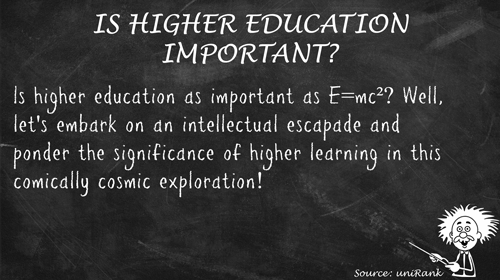
Is Higher Education Important?
Published: • Modified:
Introduction
Higher education—also called tertiary or post-secondary education—includes undergraduate and graduate study at universities, colleges and vocational or professional institutes. This article explains why higher education is important, covering personal, social and economic impacts, while acknowledging costs, access and relevance challenges. It also offers a brief comparison of outcomes for people with and without degrees.
What Higher Education Provides
- Advanced knowledge: deeper study in fields such as engineering, health, business, arts and sciences.
- Recognized credentials: degrees, diplomas and certificates valued by employers worldwide.
- Transferable skills: critical thinking, communication, teamwork, digital literacy and problem-solving.
- Professional pathways: access to regulated careers (medicine, law, teaching, architecture, etc.).
- Networks and opportunities: internships, research, alumni connections and global mobility.
Personal and Career Benefits
For many learners, higher education improves employability, earnings potential and career flexibility. Students gain confidence, independence and lifelong learning habits. Campus life, internships and projects develop leadership, collaboration and real-world problem-solving—skills that support career resilience in changing job markets.
Economic Importance
- Skilled workforce: graduates drive productivity, innovation and entrepreneurship.
- Regional development: universities create jobs, support startups and attract investment.
- Long-term prosperity: research and innovation fuel sustainable economic growth.
Social and Societal Value
- Innovation and research: solutions for health, climate, technology and public policy.
- Civic engagement: graduates often participate more in community life and public service.
- Cultural exchange: international campuses build global understanding and collaboration.
Brief Comparison: Graduates vs. Non-Graduates
On average, degree holders experience higher earnings, lower unemployment and more access to professional roles than those with only secondary education. However, success without a degree is possible—especially in skilled trades, entrepreneurship and roles where experience, portfolios and certifications matter. The best choice depends on personal goals, cost, program quality and local labor market needs.
Global Differences That Affect Importance
- Program length: bachelor’s degrees often span three years in many countries and four years in others.
- Institution types: research universities, applied sciences institutions, community colleges and vocational schools.
- Admissions: competitive exams vs. grade-based or open-access systems.
- Funding: tuition-free or low-fee models in some countries; fee-based systems with loans or aid in others.
- Learning modes: on-campus, online and blended formats supporting flexible, lifelong learning.
Challenges and Criticisms
- Cost and debt: rising tuition can limit access and delay financial milestones for graduates.
- Access and equity: barriers tied to income, location, language, disability, or social norms persist.
- Relevance and skills gaps: some programs lag behind fast-moving industry needs; work-integrated learning and updated curricula help.
- Overeducation and mismatch: in some markets, graduates may be underemployed; targeted guidance and employer partnerships reduce mismatches.
Alternatives and Complements
- Vocational pathways: apprenticeships and technical diplomas aligned to specific trades and industries.
- Short-cycle credentials: certificates, micro-credentials and bootcamps for rapid upskilling.
- Lifelong learning: continuous education—online courses, professional certifications and executive programs.
Making an Informed Decision
- Clarify goals: career interests, preferred industries and geographic mobility.
- Assess ROI: compare tuition and living costs with likely earnings and career outcomes.
- Check quality: cccreditation, curriculum relevance, faculty expertise, internships and graduate outcomes.
- Plan funding: scholarships, grants, work-study, employer support and responsible borrowing.
In Summary
Higher education remains important for many people and societies because it builds expertise, strengthens economies and supports innovation and civic life. It is not the only path to success, but when aligned with clear goals, quality programs and sustainable financing, it can be a powerful engine for personal growth and global opportunity.
Frequently Asked Questions (FAQs)
Why is higher education important?
It improves employability and earnings, builds transferable skills, supports research and innovation and strengthens communities and economies.
Is a university degree always necessary?
No. Many careers value degrees, but vocational training, apprenticeships and experience can lead to success in trades, tech and entrepreneurship.
How do I judge the ROI of higher education?
Compare total costs with expected earnings, employment rates, internship access, accreditation and graduate outcomes in your target field and region.
What are the main drawbacks of higher education?
High tuition, potential debt, unequal access and outdated curricula in some programs. Scholarships, online options and work-integrated learning can mitigate these issues.
Do online degrees have the same value as campus degrees?
When accredited and well designed, many online degrees are valued similarly by employers, especially when they include projects, labs, or internships.
How can I reduce the cost of higher education?
Pursue scholarships and grants, start at a community or technical college, study part-time while working, seek employer tuition support and budget carefully.
What matters more: prestige or program fit?
Program quality, accreditation, faculty, hands-on learning and alignment with your goals usually matter more than brand alone for long-term outcomes.

